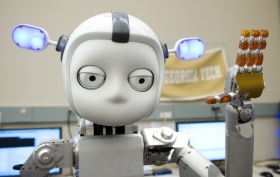Nov 5 2013
The Georgia Institute of Technology has announced the launch of its Institute for Robotics and Intelligent Machines (IRIM), the newest of Georgia Tech’s ten Interdisciplinary Research Institutes (IRIs). IRIM brings together robotics researchers from across campus—spanning colleges, departments and individual labs—to support and connect research initiatives, enhance educational programs and foster advances for the National Robotics Initiative (NRI), first announced by President Obama in 2011, and officially established in 2012.
 Human-robot interaction (HRI) research focuses on developing robots that can work cooperatively with people in dynamic human environments. Applications include building systems that are cognitively compatible with human partners, mechanical systems that account for human capabilities and control systems that model interactions with humans.(Credit: Georgia Tech: Rob Felt)
Human-robot interaction (HRI) research focuses on developing robots that can work cooperatively with people in dynamic human environments. Applications include building systems that are cognitively compatible with human partners, mechanical systems that account for human capabilities and control systems that model interactions with humans.(Credit: Georgia Tech: Rob Felt)
Georgia Tech is one of the nation’s premier robotics research universities with more than 60 faculty members and researchers developing innovative solutions for manufacturing, healthcare and first responder security, as well as for a variety of other critical areas including defense and service applications. Georgia Tech also offers the first fully integrated multidisciplinary Ph.D. program in robotics to students enrolled in a participating home school in the College of Computing or the College of Engineering.
In September, the National Science Foundation awarded more than $2 million to fund projects led by Georgia Tech researchers as part of the NRI program. Robotics initiatives across campus attract approximately $35 million annually in sponsored research from government agencies and industry partners.
IRIM will create new collaborative opportunities for faculty, strengthen partnerships with industry and government and maximize the societal impact of the transformative robotics research being conducted at Georgia Tech.
As part of its core vision and mission, IRIM enables the assembly of strong, innovative, multi-disciplinary teams to solve contemporary and future societal grand challenges.
“Georgia Tech has been making breakthrough discoveries in robotics for more than a decade, and our early successes may be attributed to the grassroots efforts of our dynamic faculty and researchers,” said KUKA Chair of Robotics Henrik I. Christensen, a Distinguished Professor in the College of Computing and the founding executive director of IRIM. “As an Interdisciplinary Research Institute, robotics research at Georgia Tech will be invigorated and supported through our continued work as a unified group of robotics leaders.”
IRIM engages the strengths of other IRIs and centers, including the Georgia Tech Research Institute (GTRI), for collaborations on projects where robotics and autonomous systems have applicability in manufacturing, health care, and national security.
“The newest IRI at Georgia Tech leverages growing expertise in robotics across the Institute,” said Robert McGrath, senior vice president and director of GTRI. “By collaborating through the newly-established IRIM, it will be easier for our research sponsors, both private industry and government, to work with us and access that expertise. I'm confident that IRIM will make us more proficient in working together for the benefit of our students, researchers and sponsors.”
In addition to GTRI, current robotics researchers represent a significant presence on campus in the Colleges of Computing, Engineering and Science. Other researchers hail from the College of Architecture and the Enterprise Innovation Institute (EI2).
“We are proud in the College of Computing to have played a central role in establishing Georgia Tech robotics as an international leader, and we are thrilled that this critical field of research now occupies a position of greater visibility and coordination across the entire campus,” said Zvi Galil, the John P. Imlay Jr. Dean of Computing. “Like many research areas in computing, cutting-edge work in robotics depends on contributions from multiple disciplines, and the new Institute for Robotics and Intelligent Machines will serve as an effective platform to inspire, harmonize and amplify the robotics research ongoing in labs across Georgia Tech.”
Through collaborations with faculty across campus and industry partnerships, IRIM leverages Georgia Tech’s resources to address evolving societal needs, such as improving surgical precision and enabling aging in place. The National Robotics Initiative identifies many of these needs as critical, including increasing manufacturing productivity and improving food safety.
An interdisciplinary focus and innovative approach are necessary to create solutions for these and other needs facing society today and in the future.” said Gary S. May, dean of the College of Engineering. “Our engineering faculty members are some of the best in the world. They are making important advances in healthcare, manufacturing and personal robotics, to name a few. I am confident their contributions to IRIM will help secure Georgia Tech’s reputation as a leader in this critical technological domain.”
Robots and intelligent machines also are playing increasingly pivotal roles in Georgia Tech research programs in the sciences.
“We are making great strides in learning how robotics technology can enrich the lives of the elderly, reveal and harness mechanisms of animal locomotion, empower mobility among injured people and explore the oceans and planets,” said Paul Goldbart, dean of the College of Sciences. “This research is of great interest in many spheres, and we are confident that increased support for it from industry will result from our partnership with the Institute for Robotics and Intelligent Machines.”
IRIM’s founding associate directors represent three campus units, amplifying the cross-campus collaboration envisioned for the new robotics IRI:
Associate Director of Research: Ayanna M. Howard, Motorola Foundation Professor, School of Electrical and Computer Engineering, College of Engineering
Associate Director of Education: Frank Dellaert, Professor, School of Interactive Computing, College of Computing
Associate Director of Industry: Gary V. McMurray, Division Chief, Food Processing Technology, Georgia Tech Research Institute
Source: http://www.gatech.edu/